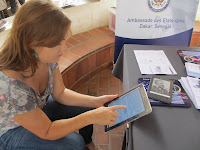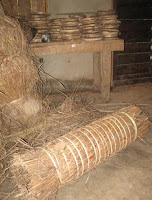 |
| Scrabble! |
Okay, that title is probably a bit of an overstatement, but
it’s kind of like I just got paid to play Scrabble. As my role implies (Peace Corps VOLUNTEER), I’m
not exactly being paid here, but the good tax-paying people of the U.S. do put
a few CFA in my account every month to help pay for my rent, food, and
transportation costs, so most of the time I pretend like I’m being paid. A couple of weeks ago I responded to a
request from the Embassy to assist with “Celebrate America Day”, an event hosted
by the Senegalese English Teachers Association.
It was held today at the Cheikh Anta Diop campus of the University of
Dakar, the same campus that was the center of political riots just a month ago. Aside from a quick drive-by from the vantage
point of a taxi, I’d never spent any time at the university until today.
My friend Amanda also volunteered to help with this event
so, despite out lack of direction from the Embassy staff about where we were
supposed to meet them or what we were actually supposed to do once we got there,
we hopped in a cab close to her Dakar apartment this morning and 15 minutes
later got let out in the middle of campus.
After wandering around aimlessly
for a bit, we asked a passing student where the English department was located
and he said he was headed in that direction so we followed him. Alhumdullilah! When we arrived at our destination the
Embassy staff were there waiting and a bit apologetic
that they’d failed to mention where we were supposed to meet them. I guess they figured that if we could
survive out in the hinterlands of the Sahel, we could figure out how to find
them. They were right.
 |
| Letters & Sciences building at Cheikh Anta Diop |
 |
| Campus library |
 |
| American Cities display with the Jefferson Memorial and the Cherry Blossoms smack dab in the middle :-) |
 |
| Amanda was entranced by the iPods and Kindles the Embassy had on display |
The day started with a grand assembly to welcome the kids from several local middle and high school English Clubs. The US Ambassador gave a speech, as did the Minister of Education and the Ambassador of Indonesia. That last one had us all scratching our heads, but I suspect there was a loose “Barack Obama once lived in Indonesia” connection there, plus the Indonesian Ambassador was adorable and smartly clad in an island-print shirt, so who were we to question his presence at Celebrate America Day?
The auditorium was crowded, with standing room only, but
apparently not as crowded as the average university classrooms are. Our Embassy point person told us that it is
not uncommon for kids to be listening to lectures while peering through the
windows, as the university is overenrolled.
The campus has 5,000 dorms and currently 60,000 students. On a quiet Saturday with not that many
students milling about this was hard to envision this, but certainly not hard to
believe.
After the initial welcome speeches the young audience broke
out into an adorable rendition of the American National Anthem at which point,
I experienced a patriotic pride most likely only felt by US Olympians when they
stand alone on their podium to accept their medal. That probably sounds overly dramatic, but
when you are only one of five people in a room of over five hundred who is
standing there with your hand over your heart while your national anthem is sung
it’s a significant moment, no matter how cynical of US affairs you may have
become.
 |
| The US Ambassador (with hand over heart) and the Indonesian Ambassador (the little guy in the print shirt) |
When the assembly was over, Amanda and I split up into two
rooms to oversee the games section of the day.
Lucky for me, a girl who has at least twelve “Words with Friends” games
on-going at any given time, I was assigned to the Scrabble room (she was just as happy in the Quiz room). The Embassy supplied three brand-spankin’ new
boards which I laid out on consecutive tables and then waited for the kids to
arrive. In typical Senegalese fashion,
things started slowly and I thought that I would spend the next couple of hours
playing a couple’s game with my new friend Lamine. As soon as I took my second turn, however,
the room started to fill and I was overseeing three, then five (somehow, two more boards
appeared out of nowhere) four-person games.
With this large group of kids came another supervisor of sorts, a
Senegalese English teacher who had participated in this event for the previous
several years. He thanked me for being
there and then quickly pointed out the error of ways, of which apparently there
were many: I had had the kids sit in the
order in which they arrived instead of by age group (mistake #1); I was not
timing the kids as they took their turns (mistake #2); and not all kids were
able to play because there were only three, then five boards, leaving 15 kids
on the sidelines (mistake #3). This
attention to the mismanagement of what I thought would be a friendly game of
Scrabble mentally transported me back to an evening at the Albemarle
County Fair about ten years ago. I
was there with a small group of friends who had volunteered to sell ride
tickets. We all took off work early to
arrive at our post in time to receive instructions before the rides
opened. Our instructor was old guy who’d
been selling tickets at the fair for decades.
He described in great detail (way more detail than was necessary) how to
take the money and hand over the tickets.
He then repeated those instructions in case we didn't understand them
and then stuck around to watch out first transactions. When my first customers arrived and I took
their cash and handed over their tickets, the old guy said with a kind of
gleeful, Ha!, I knew you couldn't do this
tone, “Now, that’s a mistake already!”
That statement has been rattling around in my head ever since and I
heard that guys voice echoing in my thoughts today.
Needless to say, I let Mr. Scrabble Aficionado run the show
and concentrated my efforts instead on proctoring one of the games. The group of middle school kids at my table,
despite being of similar ages, was clearly at different language and skill
levels. With constant pressure from the
Scrabble Nazi, I was instructed to use the stopwatch on my cell phone to move
these players along. One poor girl ended
up passing more than she played because her time kept running out. Because there were coveted prizes at stake, I
wasn’t allowed to help them along by giving hints, which pained me because I
could clearly see words available to them on their little wooden trays--“Jar, Jar, don’t you see it? You can play it right there on the Triple
Word score for 36 points!!” The
competitive nature of the whole thing made me question why I’d traveled three
hours to participate. Maybe Bobby Fisher
thrived in this environment, but I kind of thought I was doing more harm than
good in giving these kids confidence in speaking my native language—“nope,
sorry that’s not a word”, “if you don’t play in the next 10 seconds you have to
pass”. Regardless of my anxiety over
whether this was fun or not, the kids actually seemed to enjoy it and Mr.
Scrabble Head walked away with a list of winners that he could announce at the
closing ceremony, so all’s well that ends well.
We left the festivities before lunch so I was able to spend
the afternoon sitting at a sidewalk café, playing Words with Friends, eating
pizza, and enjoying a carafe of wine. It’s
all in a day’s work!
Now, if only I could figure out how to be paid to eat
Scrapple!?!
 |
| The Scrabble room |
 |
| Deep in concentration (the guy in purple won this round) |
 |
| This gal was told (by guess who) to redraw her score card using the flat edge of her tile tray. Oh brother! |



























